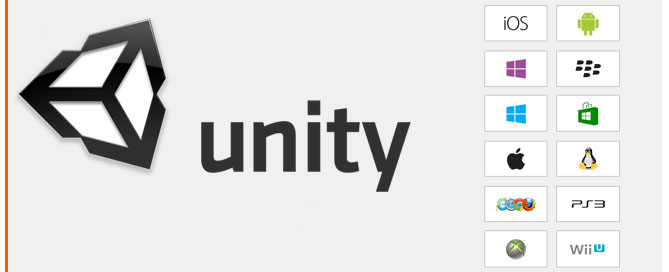Unity – Object Oriented Programming – OOP
OOP is the best way to organize your data.
NOTICE:
‘public class SingleCharacterScript’ -> deve avere lo stesso nome dello script senza l’estensione ‘SingleCharacterScript.js’
La classe è un contenitore per variabili e funzioni, ad esempio ‘public class Stuff’ contiene variabili e funzioni, è un buon modo per raggruppare cose che funzionano insieme.
Programmare in OOP significa dividere uno script in più script, ogniuno dei quali si occupa di uno specifico compito.
Qui sotto abbiamo:
– una porzione di codice ‘public class Stuff’ che contiene solo l’inventario dei proiettili, granate, missili.
– una per il movimento ‘function Movement ()’
– una per lo sparo ‘function Shoot ()’
Single Script
SingleCharacterScript.js
#pragma strict
public class SingleCharacterScript extends MonoBehaviour
{
public class Stuff
{
public var bullets : int;
public var grenades : int;
public var rockets : int;
public function Stuff(bul : int, gre : int, roc : int)
{
bullets = bul;
grenades = gre;
rockets = roc;
}
}
public var myStuff : Stuff = new Stuff(10, 7, 25);
public var speed : float;
public var turnSpeed : float;
public var bulletPrefab : Rigidbody;
public var firePosition : Transform;
public var bulletSpeed : float;
function Update ()
{
Movement();
Shoot();
}
function Movement ()
{
var forwardMovement : float = Input.GetAxis("Vertical") * speed * Time.deltaTime;
var turnMovement : float = Input.GetAxis("Horizontal") * turnSpeed * Time.deltaTime;
transform.Translate(Vector3.forward * forwardMovement);
transform.Rotate(Vector3.up * turnMovement);
}
function Shoot ()
{
if(Input.GetButtonDown("Fire1") && myStuff.bullets > 0)
{
var bulletInstance : Rigidbody = Instantiate(bulletPrefab, firePosition.position, firePosition.rotation);
bulletInstance.AddForce(firePosition.forward * bulletSpeed);
myStuff.bullets--;
}
}
}
Split in Multiple Scripts
With OOP we can split the ‘SingleCharacterScript.js’ into Multiple Script:
– Inventory.js -> public class Inventory + subclass Stuff
– MovementControls.js -> variables and functions
– Shooting.js -> variables and functions
Look at Inventory.js
– main class ‘public class Inventory’
– sub class ‘public class Stuff’ nested inside ‘public class Inventory’
– variables ‘public var bullets : int; etc…’
– constructor ‘public function Stuff ()’ it needs the same name of the class ‘Stuff’, to assign default values to variables of a class
You can construct an object in this way:
public function Stuff () // assegno valori senza variare la tipologia di variabile
{
bullets = 1;
grenades = 1;
rockets = 1;
}
Or in this way:
public function Stuff(bul : int, gre : int, roc : int) // specifico di che tipo di variabile si tratta
{
bullets = bul;
grenades = gre;
rockets = roc;
}
Creare un’istanza delle variabili, praticamente un nuovo oggetto che si basa su uno già esistente.
Notare che ‘Stuff= new Stuff’ dove ‘Stuff’ è lo stesso nome della classe
public var myStuff : Stuff= new Stuff(50, 5, 5);
In caso di costruttori multipli:
public var myStuff : Stuff= new Stuff(50, 5, 5);
USERA’
public function Stuff(bul : int, gre : int, roc : int)
PERCHE’ I PARAMETRI CORRISPONDONO (notare int – int – float)
INVECE
public var myOtherStuff : Stuff= new Stuff(50, 1.5f);
USERA’
public function Stuff(bul : int, fu : float)
PERCHE’ I PARAMETRI CORRISPONDONO (notare int – float)
Attach the Multiple Script at the SAME OBJECT
Inventory.js
#pragma strict
public class Inventory extends MonoBehaviour
{
public class Stuff // this is a subclass nested inside class Inventory
{
public var bullets : int;
public var grenades : int;
public var rockets : int;
public var fuel : float;
public function Stuff(bul : int, gre : int, roc : int)
{
bullets = bul;
grenades = gre;
rockets = roc;
}
public function Stuff(bul : int, fu : float)
{
bullets = bul;
fuel = fu;
}
// Constructor
public function Stuff ()
{
bullets = 1;
grenades = 1;
rockets = 1;
}
}
// Creating an Instance (an Object) of the Stuff class
public var myStuff : Stuff= new Stuff(50, 5, 5);
public var myOtherStuff : Stuff= new Stuff(50, 1.5f);
function Start ()
{
Debug.Log(myStuff.bullets);
}
}
MovementControls.js
#pragma strict
public var speed : float;
public var turnSpeed : float;
function Update ()
{
Movement();
}
function Movement ()
{
var forwardMovement : float = Input.GetAxis("Vertical") * speed * Time.deltaTime;
var turnMovement : float = Input.GetAxis("Horizontal") * turnSpeed * Time.deltaTime;
transform.Translate(Vector3.forward * forwardMovement);
transform.Rotate(Vector3.up * turnMovement);
}
Shooting.js
#pragma strict
public var bulletPrefab : Rigidbody;
public var firePosition : Transform;
public var bulletSpeed : float;
private var inventory : Inventory;
function Awake ()
{
inventory = GetComponent(Inventory);
}
function Update ()
{
Shoot();
}
function Shoot ()
{
if(Input.GetButtonDown("Fire1") && inventory.myStuff.bullets > 0)
{
var bulletInstance : Rigidbody = Instantiate(bulletPrefab, firePosition.position, firePosition.rotation);
bulletInstance.AddForce(firePosition.forward * bulletSpeed);
inventory.myStuff.bullets--;
}
}



